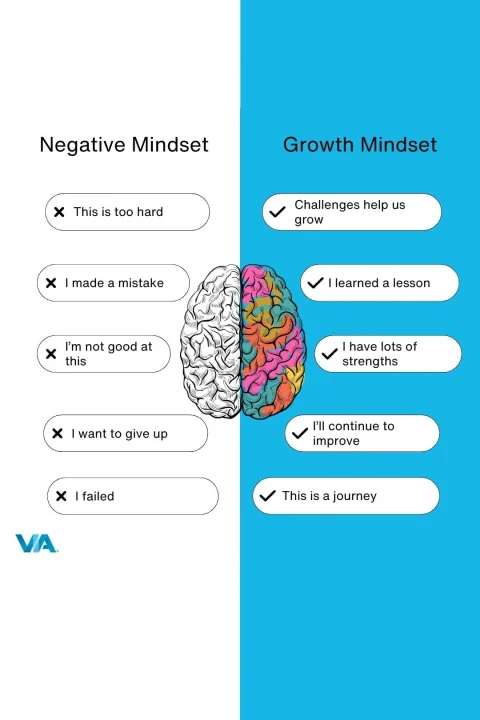Today's Monday • 7 mins read
— Reviewed by Dr. Sandip Roy.
The opposite of a negative mindset is a growth mindset, more than a positive mindset.
A negative mindset makes you believe your abilities are fixed; you cannot change them. In contrast, a growth mindset opens up a world of possibilities.
The term “growth mindset” was coined by Carol Dweck, an American psychologist and Professor at Stanford University. That phrase became a global phenomenon when her book “Mindset: The New Psychology of Success” came out in 2006.
Negative Mindset
What I mean by a negative mindset is a fixed mindset. People with this mindset hold that our abilities, talents, and intelligence are fixed traits, and we cannot change them, no matter how hard we try.
This mindset makes any obstacle in their way to success seem unmovable. Actually, the obstacle might be moved, but this fixed mindset person is fixated on the idea that trying to push it away would be a waste of time and energy. So, they won’t make any effort.
This is a negative mindset because it makes them fear failure, reluctant to take on new challenges, and easily give up when facing setbacks.
Key features of a negative/fixed mindset:
- Avoids challenges to protect self-image
- Gives up easily when faced with obstacles
- Sees making efforts as a sign of low ability
- Sees mistakes and failures as proof of inadequacy
- Focuses on outdoing others rather than self-improvement
Drawbacks of a negative mindset:
- Creates a fear of failure and risk-aversion
- Limits potential and stunts personal growth
- Leads to decreased motivation and performance
- Builds up a sense of helplessness and lack of control

Growth Mindset
Growth mindset is believing that we can develop our abilities through dedication and hard work.
People with a growth mindset believe that intelligence, talents, and abilities can be developed and improved, no matter where we stand presently.
They are ready to put in disciplined work, persevere and readjust their methods, and never stop learning. A growth mindset person loves learning, is willing to take on new challenges, and is resilient when things get tough.
Key features of a growth mindset:
- Persists in the face of setbacks
- Sees effort as a path to mastery
- Focuses on progress and self-improvement
- Embraces mistakes as part of the learning process
- Views challenges as opportunities to learn and improve
Benefits of a growth mindset:
- Fuels motivation and resilience
- Leads to higher achievement and success
- Fosters a love of learning
- Promotes personal growth and development
Growth Mindset vs. Negative Mindset

Here’s a table of differences between a growth mindset and a negative mindset:
| # | Growth Mindset | Negative Mindset |
|---|---|---|
| 1 | Promotes learning, resilience, and achievement | Leads to stagnation, frustration, and underperformance |
| 2 | Embraces mistakes as part of the learning process | Sees mistakes as failures and proof of inadequacy |
| 3 | Fuels motivation, resilience, and a love of learning | Leads to decreased motivation, performance, and a fear of failure |
| 4 | Sees challenges as opportunities to improve | Avoids challenges to protect self-image |
| 5 | Focuses on progress and self-improvement | Focuses on outdoing others rather than self-improvement |
| 6 | Believes effort is a path to mastery | Sees effort as a sign of low ability |
| 7 | Promotes personal growth and development | Fosters a sense of helplessness and lack of control |
| 8 | Leads to higher achievement and success | Limits potential and stunts personal growth |
| 9 | Developing it can unlock human potential and drive achievement | Maintaining it inhibits reaching one’s full potential |
| 10 | Promotes an internal locus of control | Fosters an external locus of control |
| 11 | Sees feedback as helpful information | Takes feedback as a personal attack |
| 12 | Responds to setbacks with increased effort | Responds to setbacks by giving up |
| 13 | Embraces learning and the process of improvement | Is only concerned with outcomes and performance |
| 14 | Sees failure as an opportunity to learn | Views failure as a reflection of inherent inadequacy |
| 15 | Thrives on strategy and planning for improvement | Relies on natural talent and luck |
| 16 | Leads to a dynamic, evolving sense of self | Results in a static, fixed sense of identity |
| 17 | Promotes a focus on the process | Gets overly fixated on the end result |
How To Go From The Negative To The Growth Mindset
Dweck’s research has shown that people with a growth mindset are more likely to embrace challenges, persist in the face of setbacks, and learn from criticism, which can lead to better outcomes.
So, how can we outgrow a negative mindset, get a growth mindset, and have more success and happiness?

Here we go:
- Reframe challenges as opportunities: When you’re faced with a difficult task, consciously shift your perspective. See it as a chance to learn and improve, rather than a threat to your abilities. For example, reframe a complex work project from a mountain-sized obstacle to an opportunity to climb a few steps at a time — tackle it in small bits, and develop new skills to solve unfamiliar problems.
- Embrace mistakes and failures: Mistakes are essential for growth — repeat it to yourself until you adopt the mindset. Reflect on mistakes as ways to find out how not to do it. See them as you would peek into a window of new insights. For instance, if you receive a poor performance review, resist the urge to get defensive and instead candidly discuss areas for improvement with your manager.
- Focus on the process, not just outcomes: Shift your focus from solely achieving the end-result to appreciating the journey of skill development and problem-solving. For example, when studying for an office exam, pay attention to how you’re learning the material, not just memorizing facts to pass the test.
- Seek constructive feedback: Actively solicit feedback from others and approach it as valuable information to guide your improvement, not as a personal judgment. For instance, ask your manager or peers for honest input on your performance, and listen with an open mind to identify areas for growth.
- Cultivate a love of learning: Foster a genuine curiosity to expand your knowledge and abilities. Engage in activities that challenge you and spark your intellectual interests. For example, read books or listen to podcasts outside your usual areas of expertise to broaden your perspective.
- Surround yourself with growth-minded people: Spend time with individuals who demonstrate a growth-oriented perspective. Their mindsets and behaviors can positively influence your own. For example, join a professional development group or community of peers who encourage continuous learning and improvement.
- Practice self-compassion: When you experience setbacks, respond with kindness and encouragement towards yourself, rather than harsh self-criticism. For example, if you fail to meet a personal goal, avoid berating yourself and instead reflect on what you learned and how you can adjust your approach.
- Monitor your self-talk: Pay attention to the inner voice in your head. When you notice fixed mindset statements, consciously reframe them to reflect a growth mindset. For instance, if you catch yourself thinking “I can’t do this,” rephrase it to “This is challenging, but I can learn and improve with effort.”
Growth Mindset & Conscientiousness
Experts believe there is a link between a growth mindset and a conscientious personality (Billingsley et al., 2021).
Conscientiousness, a personality trait in the OCEAN (Big Five) scale, means a tendency to be committed to a task or purpose.
Conscientious people are highly responsible, goal-directed, self-disciplined, and meticulous. They are more likely to be hardworking, persistent, and driven to realize their goals, especially during challenging times.
These are qualities that align very well with the core tenets of a growth mindset.
Final Words
A growth mindset is an attitude and belief.
We can intentionally grow it over time through practice and conscious effort.
Cultivating a growth mindset encourages us to view obstacles as opportunities, just as The Philosopher King Marcus Aurelius once said:
“The impediment to action advances action. What stands in the way becomes the way.”
√ Also Read: How to be resilient when things get tough?
√ Please spread the word if you found this helpful.
• Our Story!
